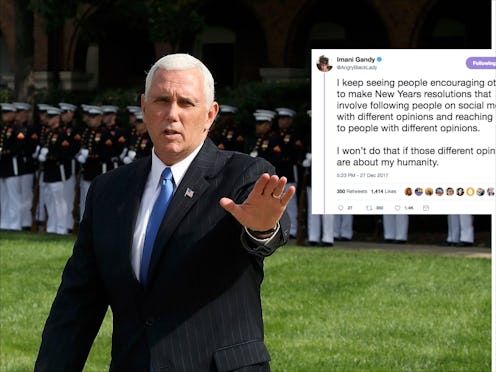News
Dear Politicians — I Don't Care About Your Religion, I Care About My Rights

Whether it's "thoughts and prayers," "God's will," or "the natural order of things," politicians of faith have a tendency to lean on religious reasoning. Take Mike Pence, who last July declared, "I'm a Christian, a conservative, and a Republican, in that order." Which is all well and good, until you consider that Pence's commitment to what he perceives as Christian values are actively infringing on the rights of others — the LGBTQAI+ community, Americans of color, and women, among others. By all means, politicians, tout your faith; when your religious beliefs are blocking my human and legal rights, however, we have a problem.
Every citizen, whether in political office or otherwise, has a right to their faith. Whether you worship in a mosque, a temple, a church, a synagogue, or any other space of your choosing, you unequivocally have the human right to do so — and this should be protected at all costs. Equally, another citizen's right to atheism, agnosticism, Humanism, or no faith whatsoever is a human right. It must be protected.
When forced to compete, human rights must trump religious rights each time.
And yet. With the advent of the Trump administration, and even long before it, religious rights have had a tendency to trump human and legal rights in the United States. Take the Hobby Lobby case, which ruled that some evangelical employers can block their employees from getting affordable birth control. Or the wave of anti-abortion legislation that has swept the country in recent years, infringing on every woman's Roe v. Wade-given legal right to a termination.
When religious reasoning is used as a defense, or an excuse, for taking away another person's rights, then we are forced to weigh the two against each other: Human rights, or religious rights?
Both are critical to a democracy. Both must be defended. Yet, when forced to compete, human rights must trump religious rights each time.
Let's take a closer look at the politicians who have leaned on their religion to support legislation, or a lack of legislation, that oppressed human rights. Last March, Rep. Jodey Arrington of Texas quoted the Bible in his push to cut food stamps: "Scripture tells us ... ‘for even when we were with you, we gave you this rule: If a man will not work, he shall not eat." To defend Roy Moore's alleged predatory behavior — which involved at one point being banned from a mall for reportedly hitting on teenage girls — an Alabama state auditor brought up the Biblical story of Zachariah and Elizabeth. An Oklahoma politician claimed that global warming doesn't stand to reason because "God is still up there."
Then there's Trump himself, who quoted Psalm 34:18 following the deadly Las Vegas shooting instead of enacting any meaningful firearm legislation. (As of this writing, no legislative action has been taken against bump stocks, which were crucial to the scale of the massacre.)
Meanwhile, in stark contrast to the tenets of Trump's travel ban, the Bible is very clear on what to do with refugees. From Levictus: "When the alien resides with you in your land, you shall not oppress the alien. The alien who resides with you shall be to you as the citizen among you; you shall love the alien as yourself, for you were aliens in the land of Egypt."
I don't mean to suggest that politicians should never invoke religion, or that many politicians don't have acute and sincere moral values they attribute to their religion. I also don't mean to imply that religion is based on outdated or immoral values, or that anybody's religious rights should be curtailed. What I am saying is that one's reasoning for political decisions, particularly when they impact a citizen's rights, must be based on human rights first and foremost — and not on the verses from a manuscript revered by your personal religion.
If you're a politician of faith, that's great. If you're not, that's great, too. If you've never really thought about it, if you identify with a religion I've never heard of, if you're still figuring it out — great. Your personal beliefs, whatever they may be, should not have any impact whatsoever on my rights as a citizen.
Editor's Note: This op-ed does not reflect the views of BDG Media and is part of a larger, feminist discourse on today's political climate.